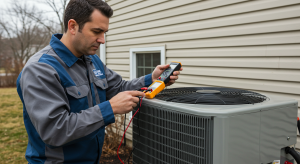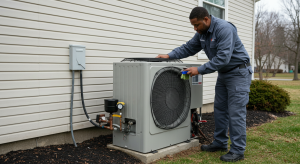As the weather warms up, it’s time to shift focus from heating to cooling. Your air conditioning system is about to take center stage, and the last thing you want is for it to break down during the first heatwave of the season. Prepping your AC system for summer is not only smart—it’s essential. With a few proactive steps, you can extend the life of your unit, improve energy efficiency, and enjoy uninterrupted comfort all season long.
Prepping Your AC System for Summer
April 14th, 2025Why Buy Now? The Benefits of Upgrading Your Air Conditioner in Shoulder Season
March 24th, 2025If you’ve been considering upgrading your home’s cooling system, there’s no better time than now. The shoulder season—those mild months between the peak demands of summer —is the ideal time to invest in your home’s comfort. If you’re looking for a new AC installation in Framingham, buying during shoulder season ensures quick installs and the best pricing of the year!
Comparing Solutions – Understanding the Value of Heating Equipment Estimate
March 10th, 2025Thinking about getting a new heating system? Whether your furnace is on its last leg or you’re just looking to upgrade to something more efficient, getting a heating equipment estimate is a key first step. But here’s the thing — not all estimates are created equal. And if you’ve ever tried comparing two estimates side-by-side, you probably know it can get confusing fast.
Let’s break it down so you know exactly what to look for, and how to make sure you’re getting the best deal — not just the cheapest price.
Get Ahead of Allergy Season & Improve Indoor Air Quality With This Technology
February 24th, 2025If you’re tired of dealing with sneezing, itchy eyes, and congestion every allergy season, it’s time to take control of the air quality inside your home. Allergens like dust, pollen, pet dander, and mold spores can linger in your indoor air, worsening symptoms. The good news? There are several indoor air quality (IAQ) solutions that can help you breathe easier and enjoy a healthier home environment. From air filters and purification systems to dehumidifiers and UV lights, here’s how to improve your indoor air quality in Framingham before allergy season hits.
It’s Never Too Late to Treat Your Heating System
February 10th, 2025Winter is still in full swing, and your heating system has been working overtime to keep your home warm. But even if the season is halfway through, it’s never too late for some preventative maintenance. A little upkeep now can help you avoid unexpected breakdowns, improve energy efficiency, and extend the life of your system. If you haven’t scheduled heating maintenance in Framingham yet, now is the perfect time to do so.
How to Prevent Emergency Boiler Repairs with Regular Tune-Ups
January 28th, 2025Want to avoid costly, unexpected boiler repairs? At Obie Comfort Solutions, we’re not comfortable until you’re comfortable. Regular tune-ups are key to keeping your boiler running efficiently and preventing emergencies. Here’s how consistent maintenance can save you time, money, and hassle while ensuring your home stays warm and safe.

Key Takeaways
- Regular boiler tune-ups are essential for safety, efficiency, and extending your system’s lifespan while preventing costly emergency repairs.
- Key components to inspect during a tune-up include the burner flame, pressure gauge, and internal filters to ensure safe and functional operation.
- Annual professional service is critical for identifying minor issues before they escalate. Neglecting this can void warranties and lead to costly breakdowns.
Top Solutions for Electric Water Boiler Repair: Common Issues and Fixes
January 28th, 2025Is your electric water boiler acting up? At Obie Comfort Solutions, we understand the inconvenience and are here to help you diagnose and fix common issues like no heat, low water pressure, and strange noises. Learn practical steps for addressing these problems to get your boiler running smoothly again, ensuring safety and proper care.
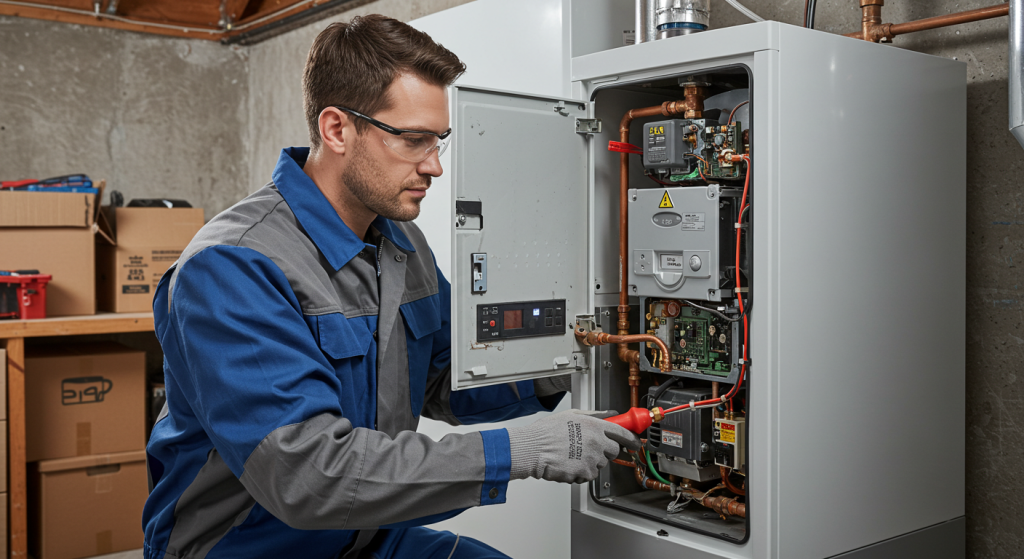
Key Takeaways
- Common issues with electric water boilers include heating problems, low water pressure, and electrical faults. Basic troubleshooting can often fix these issues.
- Regular maintenance, such as annual servicing and simple tasks like bleeding radiators, is essential to keep your boiler running efficiently and prevent costly repairs.
- For complex issues like leaks, ignition problems, or major repairs, contacting a qualified professional is critical to ensure safety and proper functionality.
Essential Steps: What to Do When Your Boiler Breaks Down
January 28th, 2025At Obie Comfort Solutions, we understand the stress a boiler breakdown can cause, especially during cold weather. As a family-owned HVAC provider serving Framingham, MA, and Greater Boston since 2006, we’re here to guide you through the necessary steps to ensure your home remains safe and warm.
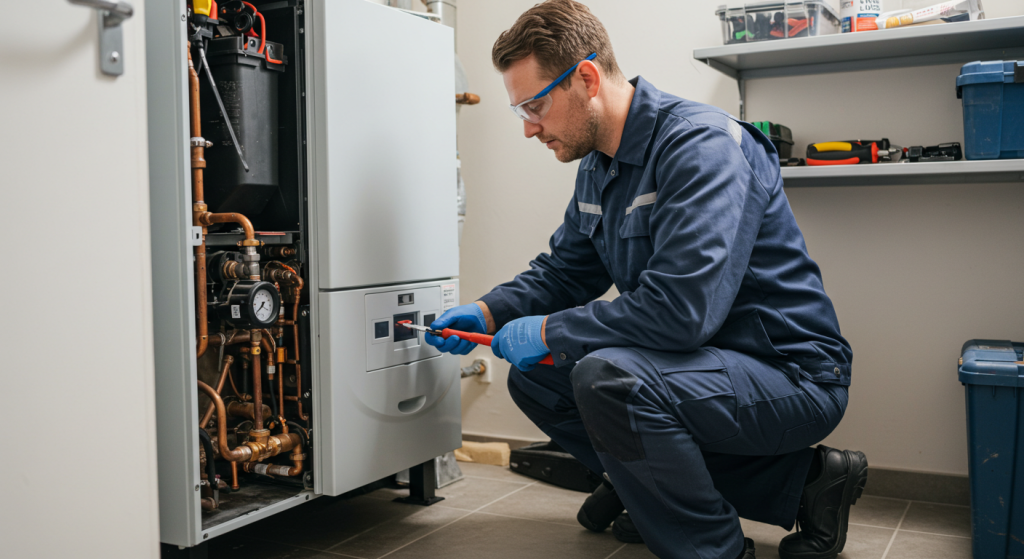
Key Takeaways
- Perform immediate checks on gas, power, and water supplies to rule out common issues.
- Monitor boiler pressure and address unusual noises or error codes to prevent further problems.
- Engage a qualified professional for persistent issues and consider boiler cover for added protection.
How to Find the Best Boiler Repair Service Near You: Top Tips
January 28th, 2025At Obie Comfort Solutions, we understand the importance of finding a reliable boiler repair service to keep your home safe and warm. As a trusted, family-owned HVAC provider serving Framingham, MA, and Greater Boston since 2006, we’re here to guide you through identifying boiler issues, evaluating repair options, and maintaining your system for long-term efficiency.

Key Takeaways
- Early Detection: Recognizing boiler issues early prevents costly repairs and ensures efficiency.
- Thorough Research: Review credentials, customer feedback, and detailed estimates to find trustworthy providers.
- Maintenance Matters: Regular servicing enhances boiler performance and keeps warranties intact.
Why Professional Heat Pump Maintenance Is Better Than DIY: The Best Choice for Efficiency and Longevity
January 28th, 2025At Obie Comfort Solutions, we know that regular maintenance is key to keeping your heat pump running efficiently and reliably. As a family-owned business serving Framingham, MA, and the Greater Boston area since 2006, we’re here to explain why professional maintenance outperforms DIY efforts when it comes to efficiency, safety, and long-term cost savings.
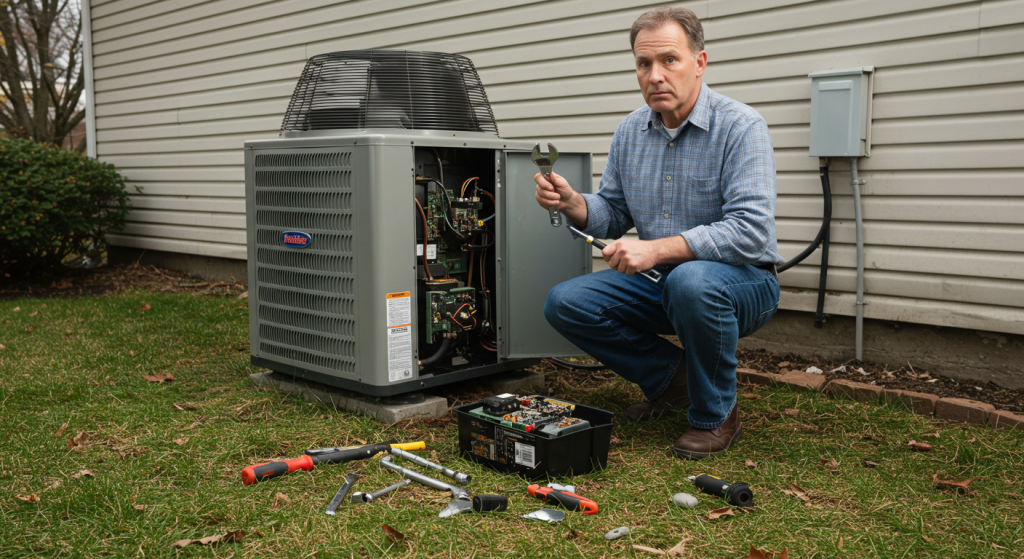
Key Takeaways
- Enhanced Efficiency: Professional maintenance maximizes your heat pump’s performance and lifespan.
- Safety and Compliance: Avoid safety risks, legal issues, and warranty voids with expert servicing.
- Long-Term Savings: Prevent costly repairs and reduce energy bills with routine professional care.

